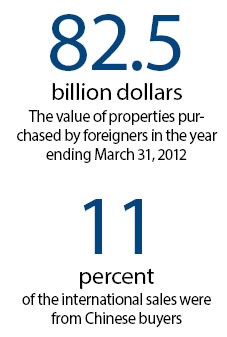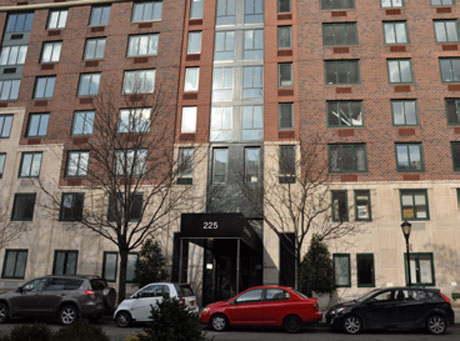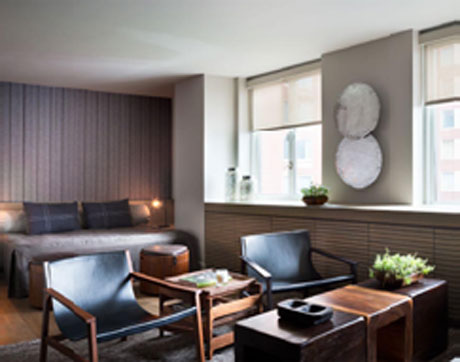Add feng shui to the mix of home-buying factors
Updated: 2013-01-25 11:20
By Liu Yuhan in New York (China Daily)
|
||||||||
|
The owner of this Manhattan building hired a prominent designer to use feng shui in its interior. Liu Yuhan / China Daily |
Amid high demand from wealthy Chinese for US residential and commercial properties, New York real estate firms are wooing buyers by incorporating feng shui concepts into interior designs.
Related Companies, a privately owned US real estate group that manages properties worth $15 billion, took over 225 Rector Place, a 24-story luxury condominium building in Manhattan's Battery Park City neighborhood.
It then hired Clodagh, an internationally acclaimed interior designer who goes by one name, to incorporate feng shui elements into the building's design.
"Wherever you go, wherever you look, it should be beautiful," said Clodagh, an Irish designer who has lived in New York for 25 years and boasts an award-winning portfolio of work in two dozen countries.
Feng shui is an ancient and complex body of knowledge developed 3,000 years ago in China. Feng means wind and shui means water. The combination of good feng and shui usually means, in Chinese culture, good health and fortune, and vice versa.
"The five essential elements of feng shui must be represented in the design of 225 Rector Place - metal, wood, water, fire and earth," said Clodagh, who became interested in feng shui in 1985.
"Also, the colors must be right for the location, so I included red for fire energy and black for water. And I use 'up' light as well as 'down' light to lift energy, rather than compress it."
Clodagh, whose projects include million-square-foot hotels, residential buildings and spas, also said she rids kitchens of stale, unused items "so that stagnation is abolished and energy flows smoothly".
From 225 Rector Place, which faces the Hudson River, residents can see the Statue of Liberty. Units range from studios to three-bedroom apartments, at prices of about $500,000 to more than $2 million. The building contains some 300 units, 72 of which were sold by the original developer. After Related came in, 181 units were available to sell.
And results exceeded the developer's expectations.

"We sold about 120 of the 180, and almost half of the buyers were from China," said Sherry Tobak, senior vice-president of sales at Related and sales director at 225 Rector Place. She said the firm hoped to bring greenery and water elements into the design in response to Chinese customers' love of water, which traditionally represents wealth.
"The hallway carpeting is an example. It was inspired by images of flowing water over stones.
The building is close to the site of the World Trade Center and Manhattan's Chinatown, and faces the Hudson River.
Chinese buyers typically look for homes as an investment or to use as a residence for children who might someday study in the US.
"My experience is, when you sell to one Chinese buyer, he works in a tight community, and the buyer will tell people around him," Tobak said.
One deal can yield as many as 10 references from a satisfied Chinese client, she said.
To better understand wealthy Chinese clients and their culture, Related built relationships with several Chinese-speaking buyers as well as lawyers and mortgage brokers, who can help in an international purchase.
Brokers are optimistic about Manhattan's real estate market in 2013, due to an inflow of investors from abroad, with Chinese a powerful segment, said Nikki Field, vice-president of Sotheby's Realty.
According to the National Association of Realtors, a leading US industry group, low prices and the relatively weak dollar are major reasons for increased US purchases by foreigners.
International sales totaled $82.5 billion for the 12 months ending in March 2012. China-based clients accounted for 11 percent of the total, up from 9 percent in the same period a year earlier, making them second only to Canadians as leading buyers of US residential property.
Consideration of feng shui factors into nearly every purchase decision by Chinese clients, according to Gary Kiyan, director of sales and brokerage services at New York's Anchor Associates. He has dealt with Chinese real estate investors in Manhattan.
"Chinese buyers - and renters - are interested in location and price primarily," Kiyan said.
"After the area and price are established, they will express interest in the feng shui aspects of the apartment."
Numbers also play a big role in feng shui considerations, as Kiyan has learned.
"Many Chinese clients have also expressed interest in the number 8, which in Chinese sounds like 'fortune', so apartments on the 8th or 16th floor seem to hold interest for some Chinese buyers," he said.
"We have seen an increase in Chinese buyers and renters and expect more in the future," Kiyan said.
"The pattern is similar when we have Chinese-American buyers. Feng shui seems to be an important element in attracting interest to certain locations or buildings for both Chinese buyers and Chinese-American buyers."
Susan Wu, a sales agent with Exit Kingdom Realty, also has concluded that feng shui does indeed affect buying decisions.
"I definitely believe that the feng shui aspects matter in deals," she said.
"That's a typical question I ask my clients, and 8 out of 10 Chinese or Asian-Americans care," Wu added. "Even if some of them don't, their parents who help with the purchase will, which ultimately affects the purchasing process."
liuyuhan11@chinadailyusa.com
|
This model unit at 225 Rector Place incorporates all of the elements of feng shui: metal, wood, water, fire and earth. Provided to China Daily |

 In Photos: 7.0-magnitude quake hits Sichuan
In Photos: 7.0-magnitude quake hits Sichuan
 Li Na on Time cover, makes influential 100 list
Li Na on Time cover, makes influential 100 list
 FBI releases photos of 2 Boston bombings suspects
FBI releases photos of 2 Boston bombings suspects
 World's wackiest hairstyles
World's wackiest hairstyles
 Sandstorms strike Northwest China
Sandstorms strike Northwest China
 Never-seen photos of Madonna on display
Never-seen photos of Madonna on display
 H7N9 outbreak linked to waterfowl migration
H7N9 outbreak linked to waterfowl migration
 Dozens feared dead in Texas plant blast
Dozens feared dead in Texas plant blast
Most Viewed
Editor's Picks

|

|

|

|

|

|
Today's Top News
Live report: 7.0-magnitude quake hits Sichuan, heavy casualties feared
Boston suspect cornered on boat
Cross-talk artist helps to spread the word
'Green' awareness levels drop in Beijing
Palace Museum spruces up
First couple on Time's list of most influential
H7N9 flu transmission studied
Trading channels 'need to broaden'
US Weekly

|

|









